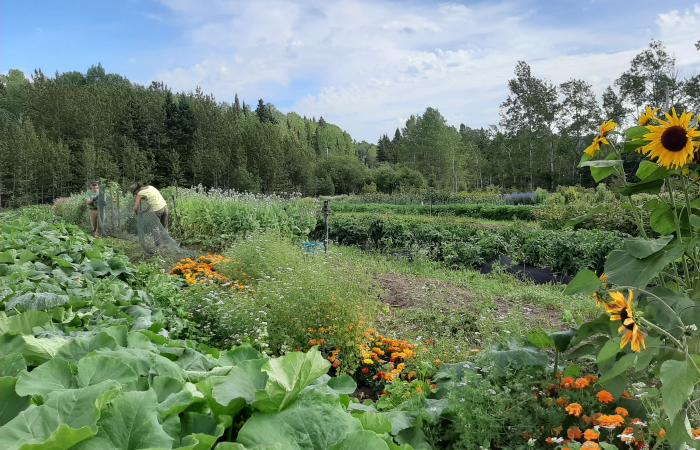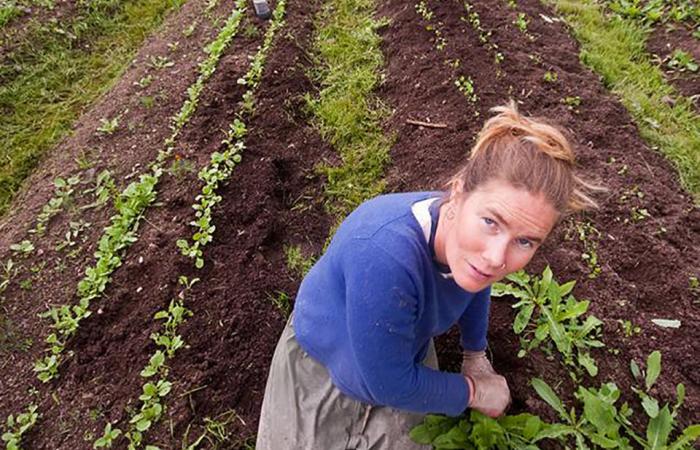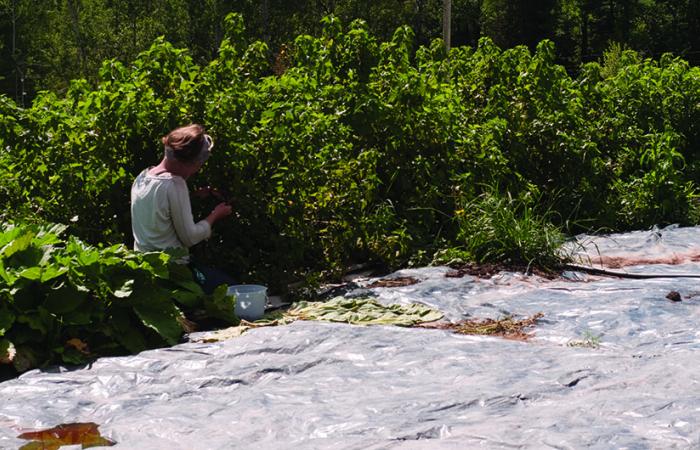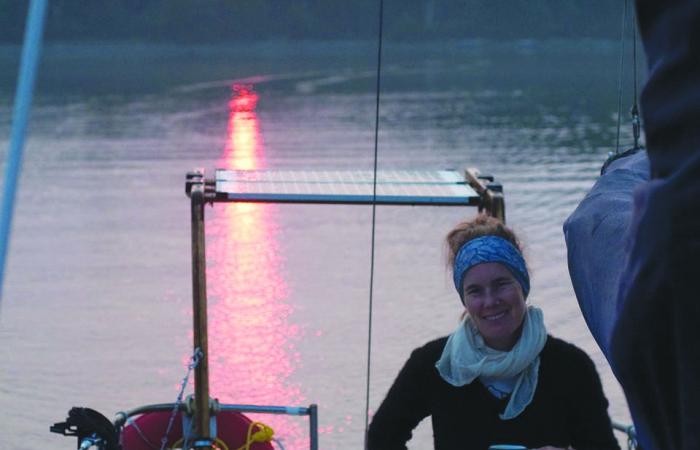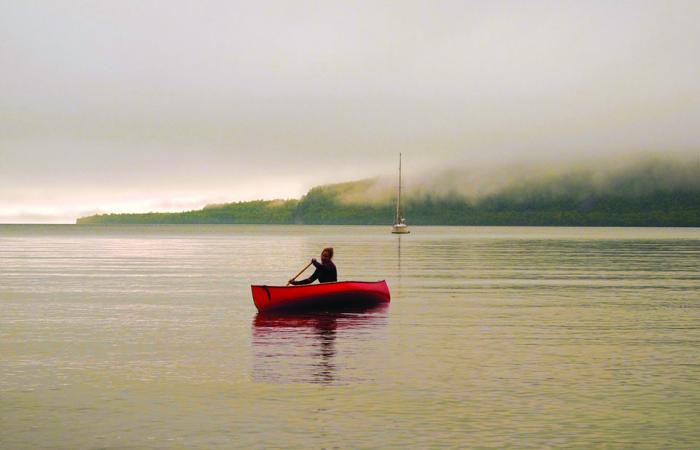Interviewing Evalisa McIllfaterick was memorable. We decided to get together to chat on a winter morning. Instead of sitting indoors with a warm cup of coffee, we bundled up in my backyard so we could have a properly social-distanced conversation. What could have been a challenge turned out to be a delight. We listened to the birds sing and I spotted a Red-breasted Nuthatch for the first time in my yard. Although it was great to chat outdoors, it was hard for me to takes notes with my mitts on!
Evalisa grew up in Ottawa where she honed her love for the outdoors. During her high school years she worked at summer camps. Her education path brought her to Thunder Bay in 1999 when she enrolled in the Outdoor Recreation degree program at Lakehead University. She says her university program helped her develop skills in many areas, including writing, critical thinking, leadership and expedition planning. She realized that much of her education was hands-on and she feels that the mix of academic and practical skills have helped her today in her career as a vegetable farmer. “Farming has been a good fit for me because I use my brain to work things out, but I also need to use my physical skills. There is lots of academic research that will tell you how to grow carrots but you have to be able to adapt as a farmer. There are bugs, repetitive motions, different mixes of soil…but I still have to figure out the best way to grow these crops.”
As the owner of Root Cellar Gardens a 50-acre property in South Gillies, Evalisa works year-round with her business. After university, when Ev decided to purchase some land for a garden, the area around Thunder Bay fit the bill. It was too expensive in the Ottawa Valley or out west where her parents were now living. Thunder Bay was accessible. The cost of the land was manageable for a single person and she just loved Lake Superior. “I feel super lucky that I get to be in the place that I most want to be,” she laughs.
Ev’s business started with a winter Community Supported Agriculture initiative (CSA) seven years ago. She would pick the vegetables all summer at her farm and store them in her root cellar. Then, over 12 weeks from November to February, her customers (who bought subscriptions to her CSA program) would come to pick up a new selection of vegetables from her. Then in her 2020/2021 season, as many businesses have, she has learned to make changes because of COVID. During the summer, she established a summer CSA where many of her rural neighbours came to her farm to pick up their veggies. Her customers used to pick up their winter vegetables every second Saturday, but that was not possible this year. By partnering with Belluz Farms and Superior Seasons, she established a delivery service for her customers. “I miss the regular contact with my customers because we used to talk about what they liked, didn’t like, how they prepared their veggies. I don’t get to see everybody, but I like the way the community has come together to help out. And it’s great to work with community partners like Belluz Farms and Superior Seasons.”
Ev also plays an active role in seed preservation and sharing, like I remember my own Grandmother Angus doing on her veggie garden on North Harold Street. She says that keeping the seeds is important for food security and for adapting to climate change. She takes an active role in seed preservation and sharing because she says it’s a way to see what seeds grow well in our climate and in her soil. One of the fun things that she participates in is a carrot tasting. In one of her CSA delivery packages, she had four varieties of carrots, all cut in different patterns, and she asked her clients to rate them for taste. This kind of information helps the farmers to see what types of seeds should be developed and cultivated. At her 2019 carrot tasting, the patented hybrid variety Bangor carrot came out as the winner. If you think a carrot is a carrot, I encourage you to cleanse your palate between bites and try different varietals. Believe me, you will have a definite winner – carrots certainly can and do taste different!
Ev is also an adventurer. While traveling solo in Australia many years ago she was driving her car to Sydney to sell it to a fellow traveler whom she had met earlier. But she never did get to sell that car. Traveling in the oceanside town of Coff’s Harbour she had a car accident. With a cracked pelvis, tailbone and back she lay in the hospital. “I had met a nurse the day I was brought into the hospital and I happened to see her again on the day I was getting discharged. I had just gotten my lesson on how to walk upstairs with my crutches. I didn’t know anyone in town and there I was, pretty drugged up, being released from the hospital. The nurse asked where I was going to go,” Ev said. “When I said I didn’t know, that nurse invited me to come and live with her and her husband.” This kindness of strangers came for Ev at a crucial time. They lived in a lovely area with lush tropical trees and vegetation surrounding them. Ev stayed for about 2 or 3 weeks until she was able to travel solo again. That rehabilitation was what Ev needed and it even included ocean therapy. “They knew I loved to swim, so Dwayne, my Aussie friend, would carry me out into the water. I’d just float around and it was amazing!”
When she returned to Canada and was a student at Lakehead University, Ev, who loved canoe tripping, made plans with a friend to paddle across Canada. “We had met when we both worked at summer camps in Ottawa and here we both were living in Thunder Bay.” They spent the summers of 2004, 2005 and 2006 paddling. Their journey took them from Tuktoyaktuk, Northwest Territories and concluded outside Montreal. “My mom didn’t want to know anything about my trip the first year because she was so worried. But after that first summer she was ok. She was really proud.”
Today, Ev enjoys canoeing and sailing with her partner, Paul Smyk. Lake Superior is her playground. Even though she loves the water, she finds joy in winter too, with cross-country skiing and snowshoeing. “I like the openness of the bush in winter. You can see so much more because the leaves are off the trees and it looks like a different world. I just love snowshoeing on a south-facing slope on a February day when there is a little heat in the sunshine.”
Concerned with possible COVID-related shortages, many people are asking Ev about storing vegetables in their homes, as our parents and grandparents did. Ev suggests that before you buy 100 pounds of potatoes to store in your basement or in a cold room, test it out with a 5-pound bag first. Think of how they are packaged in the store. Tupperware with the lid ajar may be good for some, while others are better in a plastic bag with air holes. This might be the year, if you don’t already do it, to think about your own small root cellar project.
When asked if any good has come out of COVID, Evalisa mentions adaptations and little things people have done to make their world nicer. She speaks of a neighbour who lived alone and approached her to barter her time in exchange for vegetables. They have now become friends. She had said that COVID made her world smaller because friends weren’t visiting as much. The opportunity to help Ev with the garden keeps her in touch with people and makes her feel good.
When I asked Ev what she would say to others to get through these interesting times, she raised her coffee cup and said: “Here’s to creative resilience!” I would echo that sentiment. Let’s keep looking for magic around us like the little, irrepressible nuthatch that dropped into our meeting, our own little “Ambassador of Hardiness” during these challenging and interesting times.

